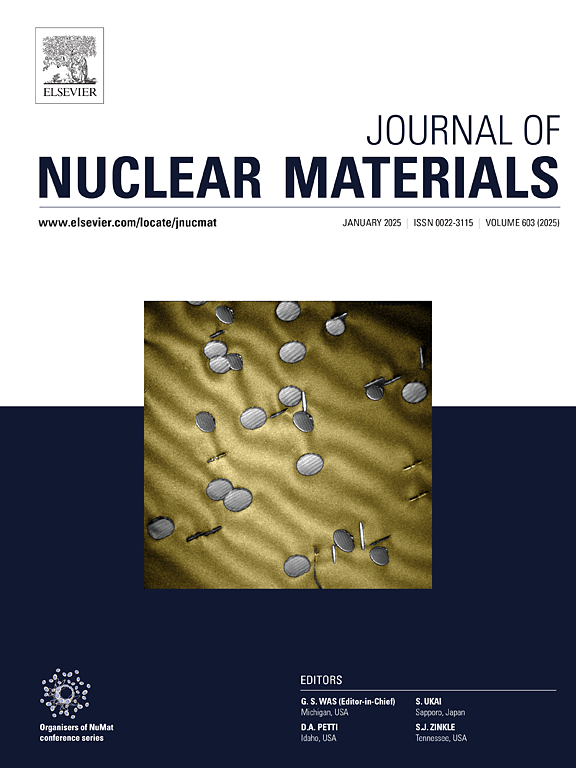High-temperature tensile strength and anisotropic evaluation of fine-grained graphite based on disc compression
IF 3.2
2区 工程技术
Q3 MATERIALS SCIENCE, MULTIDISCIPLINARY
引用次数: 0
Abstract
This study investigated the high-temperature tensile strength and anisotropic behavior of fine-grained nuclear-grade graphite IG-11 by the Brazilian disc compression method. A total of 420 cylindrical specimens were tested across a temperature range from 25 ∘C to 1000 ∘C, exploring tensile strength variability in both with-grain (WG) and against-grain (AG) orientations. The experimental results were analyzed using normal and Weibull statistical distributions, emphasizing the three-parameter Weibull model for the superior accuracy in capturing low-failure probability behavior. The findings revealed that tensile strength increased with temperature, stabilizing near 25 MPa at elevated conditions, while WG samples exhibited greater strength consistency compared to AG samples. The anisotropy of IG-11 graphite showed minimal variation under high temperatures. According to the analysis of characteristic values, the results provided critical insights into evaluating the tensile strength of fine-grained graphite, offering practical recommendations for safety assessments in advanced nuclear energy applications.
基于圆盘压缩的细粒石墨高温拉伸强度及各向异性评价
采用巴西圆盘压缩法研究了细粒核级石墨IG-11的高温拉伸强度和各向异性行为。在25°C到1000°C的温度范围内,对420个圆柱形试样进行了测试,探讨了顺粒(WG)和反粒(AG)两种取向下的抗拉强度变化。实验结果采用正态分布和威布尔统计分布进行分析,强调三参数威布尔模型在捕获低失效概率行为方面具有优越的准确性。结果表明,拉伸强度随温度升高而增加,在高温条件下稳定在25 MPa左右,而WG样品的强度一致性比AG样品高。IG-11石墨的各向异性在高温下变化不大。根据特征值的分析,结果为评估细粒石墨的抗拉强度提供了重要见解,为先进核能应用的安全评估提供了实用建议。
本文章由计算机程序翻译,如有差异,请以英文原文为准。
求助全文
约1分钟内获得全文
求助全文
来源期刊

Journal of Nuclear Materials
工程技术-材料科学:综合
CiteScore
5.70
自引率
25.80%
发文量
601
审稿时长
63 days
期刊介绍:
The Journal of Nuclear Materials publishes high quality papers in materials research for nuclear applications, primarily fission reactors, fusion reactors, and similar environments including radiation areas of charged particle accelerators. Both original research and critical review papers covering experimental, theoretical, and computational aspects of either fundamental or applied nature are welcome.
The breadth of the field is such that a wide range of processes and properties in the field of materials science and engineering is of interest to the readership, spanning atom-scale processes, microstructures, thermodynamics, mechanical properties, physical properties, and corrosion, for example.
Topics covered by JNM
Fission reactor materials, including fuels, cladding, core structures, pressure vessels, coolant interactions with materials, moderator and control components, fission product behavior.
Materials aspects of the entire fuel cycle.
Materials aspects of the actinides and their compounds.
Performance of nuclear waste materials; materials aspects of the immobilization of wastes.
Fusion reactor materials, including first walls, blankets, insulators and magnets.
Neutron and charged particle radiation effects in materials, including defects, transmutations, microstructures, phase changes and macroscopic properties.
Interaction of plasmas, ion beams, electron beams and electromagnetic radiation with materials relevant to nuclear systems.
 求助内容:
求助内容: 应助结果提醒方式:
应助结果提醒方式:


